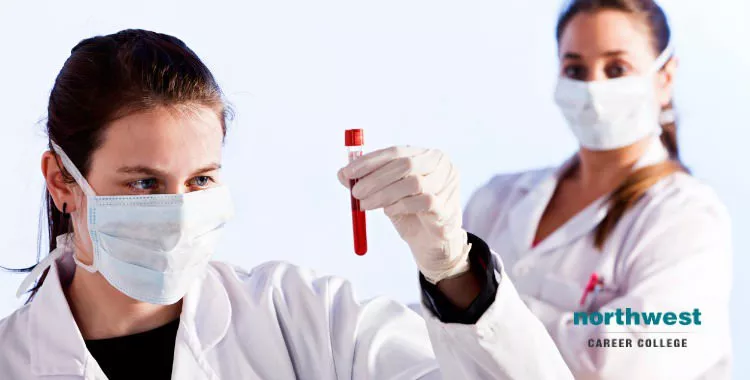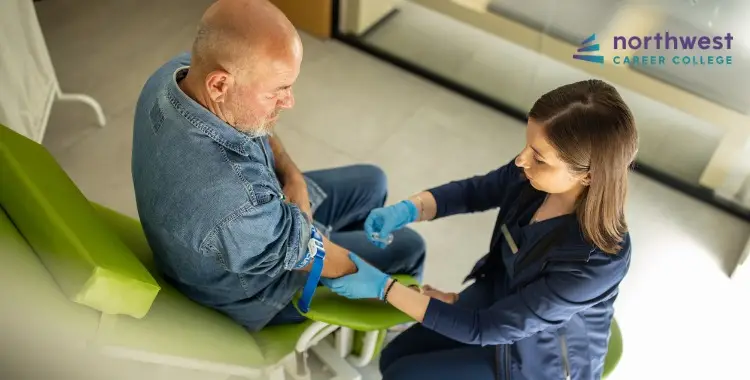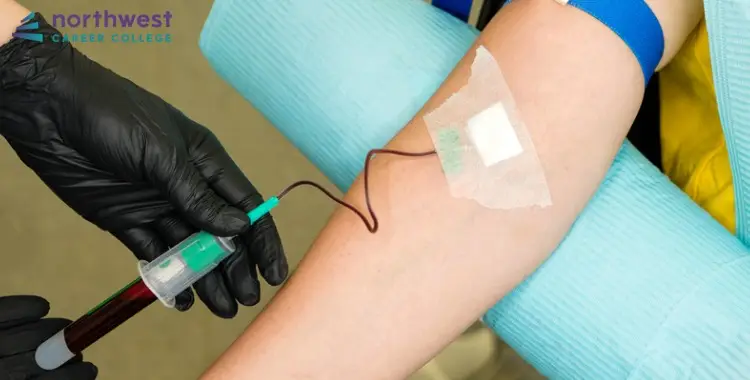What Is It Like To Work As A Phlebotomist?
- Phlebotomy Technician
- March 11, 2024
- 3.0k views
- 5 min read

Phlebotomy is the practice of drawing blood from a patient and taking the specimen to the laboratory to prepare for testing. As such, phlebotomists draw blood from patients, a procedure known as venipuncture, for tests, transfusions, research, or donations. Most phlebotomists work in hospitals, medical or diagnostic laboratories, blood donation centers, and doctors offices.
Table of Contents
A Day in the Life of a Phlebotomist
This is a general overview of a typical day in the life of a phlebotomist. It’s important to note that this is only meant to give you an idea of what a normal day might look like, and of course, this can vary depending on many factors.
Receiving Orders
Phlebotomists usually start very early in the morning — around 5 or 6 AM. They tend to start so early to ensure that blood results are accurate and consistent. In order to do this, they need to draw blood from patients when their body is in a homeostasis state. This means that the body chemistry and blood are at a steady state as they have not eaten breakfast, have not done any type of exercise or activity which could interfere with test results.
They begin their day by receiving orders from different departments, which directs them where to go. It’s important to have a keen eye for detail, as they need to identify their patient, medical record and, date of birth before drawing blood.
Drawing Blood
To draw blood, phlebotomists, apply a tourniquet, select a vein, cleanse the skin, insert the needle and collect blood to save for testing or transfusion. Some patients have “great veins” for drawing blood, however, there are many patients, especially seniors and small children, that may pose more of an issue when looking for a vein.
Phlebotomists must have good people skills. Since many people are scared, even petrified or nervous about giving blood, the best phlebotomists are those that can ease patient nerves and have empathy for their sentiments. Even though phlebotomists see this day in and out, and the process is incredibly normal to them, few people give blood often, therefore, they may be unsure or reluctant at first.
The Role Phlebotomists Play
Phlebotomists play an incredibly important role in the field of healthcare. Depending on the patient’s condition, the ability to obtain a proper blood sample can literally save their life.
Before even meeting a patient, they generally check with the nursing station on that floor to ensure that the patient’s status has not changed since tests were ordered. Oftentimes, phlebotomists have to interrupt a patient’s sleep to take tests. Doing so sometimes requires working with grumpy patients, but all parties know it’s for the greater good. Because of this, phlebotomists typically have a great bedside manner, and always work toward putting patients at ease.
As discussed earlier, some patients may have a difficult time giving blood. In this case, phlebotomists may need to employ the help of a nurse to successfully draw blood. Most of the time, they do this on their own, but there are always a few patients, be it that they are elderly, young, or have certain medical conditions that require extra help. Throughout the day, phlebotomists work with all sorts of patients, kids, pregnant women, new babies, post-surgery patients, seniors, etc.
Once blood is drawn, tubes of the patient’s sample are carefully marked and sent to a lab for analysis. There, the vials will be placed in a centrifuge to separate the plasma from the blood. Next, each vial is arranged by the type of test that is to be performed on it. Then phlebotomists refill their cart, take a break (if they have time), and start all over again!
Sometimes phlebotomists get called on to help with blood transfusions for critical patients. In this case, they are responsible for ensuring that the new blood is cross-matched with the patient’s blood type and that their tray has the necessary equipment to set up a proper transfusion.
Types of Hours Phlebotomists Work
Depending on where they work, phlebotomists may have a regular day shift, but if they work in a hospital or urgent care center, they may have the same types of shifts as nurses. This means that they typically work a few days shifts, have a day or two off, and then work a few night shifts. Phlebotomists may work full or part-time or may be on call as needed.
Join One Of The Premier Phlebotomy Schools in Las Vegas
At Northwest Career College, we pride ourselves on providing one of the premier Phlebotomy Schools in Las Vegas. Our phlebotomy students have an 89% national exam pass rate and you can graduate in as little as three months. Our established seasoned instructors will take you through every aspect of Phlebotomy and Northwest offers day, afternoon and night classes to accommodate your busy Las Vegas work and family schedule. Call us today at (702) 403-1592 to speak to one of our admissions specialists about your new Phlebotomy career.



